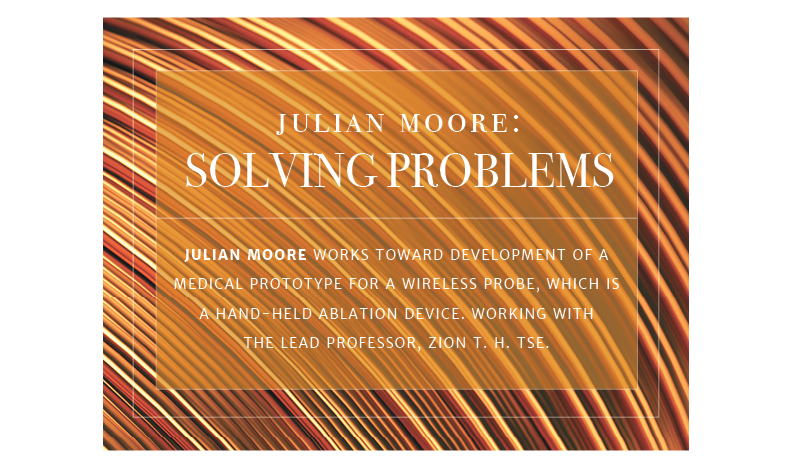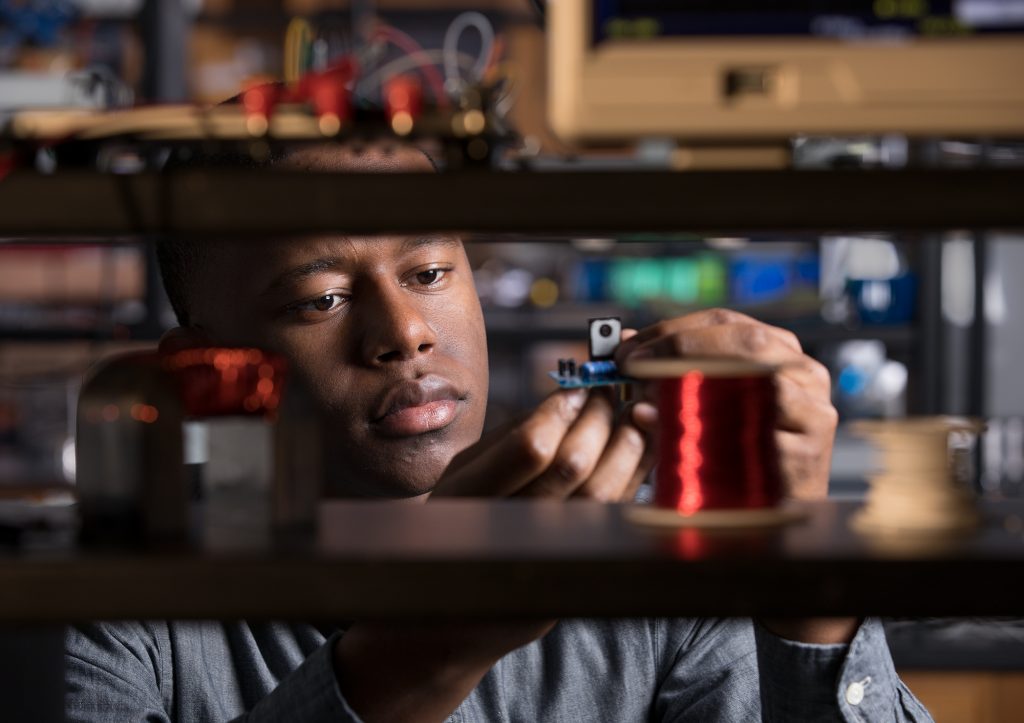Julian Moore
By: Cynthia Adams | Photos By: Nancy Evelyn
Julian Moore, a graduate student in the UGA Medical Robotics Lab in the School of Electrical and Computer Engineering, working under Associate Professor Zion T. H. Tse, did not have to struggle in order to find himself. He already had. Moore was focused from a young age, always knowing he wanted to be an engineer.
“I didn’t know what type, but I just wanted to solve problems.”
He knew exactly what he would study. The bigger problem was figuring out where he would study.
Energy and green technologies initially attracted Moore while growing up in Smyrna, Ga. He considered studying environmental engineering. There were plenty of problems to work out there.
“I got to thinking about alternative energy sources,” he says. “Wind turbines, solar panels, etc. Then I realized, all I wanted to do was make electricity.”
Somehow, the nearby option, Georgia Tech, didn’t seem like the right fit for him, given “that Georgia Tech was immersion. I decided not to go to an engineering university.” Instead, a university with more disciplinary diversity like Georgia offered an array of possibilities.
Moore chose UGA’s engineering program, a place where broader options existed. The College of Engineering is the most recent addition to UGA’s 17 schools and colleges. It offers specialized disciplines beyond traditional engineering including agricultural, biochemical, electrical and computer, environmental, and biological/agricultural.
According to the UGA Graduate School, state-of-the-art facilities help rank it among the nation’s largest and most technologically advanced research institutions. UGA offers 150 master’s programs, and 94 doctoral programs, in addition to 46 interdisciplinary programs.
“I wanted to go somewhere that it wasn’t all about engineering; I wanted a balance between my social life and my schooling,” Moore says, adding he also liked the idea of a sprawling campus with many possibilities, one large enough in which to lose himself. In Athens, there was space and opportunity for research, invention, exploration, and creativity.
Plus, there was the allure of music at UGA. As a music lover, Moore was eager to play trombone in the UGA marching band, and did so for several years.
“I was in the marching band for 2013 and 2014 seasons, and I was in the basketball band for the 2013-14, 2014-15, and 2015-16 seasons. There are about 350 musicians in the band. I loved it,” he smiles.
Could he have been a musician instead of an engineer?
“Maybe. It never came naturally to me, like others. Plus, I would rather do engineering than music.” Moore completed his bachelors in Electrical and Electronics engineering at UGA in 2017 and will complete his master’s degree in 2019.
He works alongside fellow engineering students, each pursuing various technologies. Sometimes, he says he is creative. At other times, “I feel like I am in my bubble,” he jokes ruefully.
Moore’s brother, Quentin, is also a Georgia Dawg. Also technically minded, Quentin is a fifth-year pre-med student.
Intense schedules, however, don’t allow the brothers a lot of free time for just hanging out. Even during the summer, Moore has been busy exploring opportunities for a medical innovation.
Funding Innovation
This year, Moore worked from July-September in the Washington, D.C. area with a research grant from the National I-Corps. Technically, the I-Corps is the National Science Foundation’s Innovation Corps, which supports research endeavors with an entrepreneurial twist.
The I-Corps program is targeted to innovators like Moore, who was a grant recipient and an Entrepreneurial Lead.
Moore has been working with his lead professor to develop a wireless device to use with liver tumor ablation. The device is currently under development and refinements are ongoing.
With the I-Corps funding, Moore was able to travel across the country late summer into early fall. He visited eight states in order to interview 100 potential users of the ablation device working in the field of interventional radiology.
“I had to conduct 15 interviews with interventional radiologists per week as required by the grant.” It was an immersive and compressed experience extending over the six weeks, according to Moore.
“I went to a few interventional radiology symposiums,” he says, and “interviewed several people from physicians to venture capitalists.”
After entering each of the 15 weekly interviews into the system, Moore gave presentations to the I-Corps instructor team. The exposures were intense.
Although he “went everywhere,” Moore said the travel was tightly planned, allowing for little beyond a quick tour before knuckling down to work. “They just wanted to make sure you got the interviews.”
Moore was very process-oriented and focused on the end user. “We were thinking about the problems users of the current devices have and how we can address those issues.”
The first prototype of the ablation generator system, developed to be used in liver tumor ablation, is battery powered. Moore explains that the device “is basically like a wirelessly powered charging pad. Give it a charge and it creates a magnetic field.”
The ablation probe, powered wirelessly by the generator, thus provides the operating physician a free range of motion during the procedure, he adds.
Most such ablation tools are hardwired, and commonly guided by image-producing technologies such as computed tomography, or CT.
Moore has experimented with various applications for the ablation device. He first studied Radio Frequency ablation, then working with a cardiologist in order to investigate cardiac uses. Since then, the device has been focused upon tumors rather than cardiac applications.
Having completed the required 100 interviews with interventional radiologists, Moore better understands their problems and needs.
“The wireless feature is nice, but they were interested more in accuracy.” Better tumor targeting and needle positioning were uppermost among the doctors’ concerns.
“We hope to create something better that will appeal even more to the doctors,” he says. They are further investigating how to make the procedure more accurate.
“Right now, they already have different types of ablation,” he explains, including microwave, which is currently the most popular. “We’re exploring options to modify our current prototype to more directly address the needs of the users.”
The I-Corps program, with emphasis upon “researchers and scientists who want to commercialize their projects and make sure they do not make something that nobody wants,” was exhaustingly thorough but effective, Moore explains.
He is processing what he learned from field investigations, which reinforced much of what they already knew.
“How to prevent damage to surrounding tissues?” says Moore. “It’s really the power and the positioning of the probe. Interventional radiology provides alternatives to highly invasive surgeries.”
Moore notes that, “At first we wanted to do something totally different, but after interviewing them (the radiologists), we realize they want something like they are used to, but more accurate.”
Many tumor ablation probes are expensive, and only single-use. Using probes that they obtain from Athens Regional for their own experimentation, the UGA researcher is conducting further tests working with pig livers. While they haven’t yet ablated a tumor inside the body, they see potential applications for kidney, prostate, breast, or any tumorous tissue.
The Joy of Music
Moore finishes his graduate program in May next year.
When he has rare free time, Moore enjoys cooking and hanging out with his friends. He also listens to music, mostly rhythm and blues, and sometimes attends the Atlanta Symphony Orchestra’s concerts.
And despite the problem-solving time offered while riding a campus bus, Moore usually walks instead to keep fit. Of course, music, too is always an outlet.
Does he have a favorite song? The question briefly stumps him; he has varied musical tastes.
“It depends on the week…I was able to see most of my favorite artists in concert in 2017. So, I guess, either Frank Ocean, or something by Erykah Badu.”
NSF Innovation Corps (I-Corps™)
The National Science Foundation (NSF) I-Corps program prepares scientists and engineers to extend their focus beyond the university laboratory, and accelerates the economic and societal benefits of NSF-funded, basic-research projects that are ready to move toward commercialization.
According to Graduate School Dean Suzanne Barbour, UGA is the recent recipient of a grant from the NSF for an iCorps site: (https://ugaicorps.uga.edu/i-corps-program/).
Through I-Corps, NSF grantees learn to identify valuable product opportunities that can emerge from academic research, and gain skills in entrepreneurship through training in customer discovery and guidance from established entrepreneurs.
I-Corps Teams participate in the seven-week I-Corps curriculum. Each I-Corps Team learns what it will take to achieve a commercial impact with their innovation. The I-Corps curriculum enables Teams to systematically identify and address knowledge gaps in order to understand the most appropriate path forward for their technology concept. I-Corps Team awards support the team’s participation in the curriculum and their customer discovery work.











